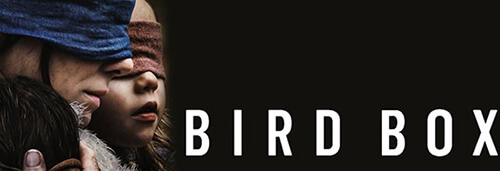Bird Box (2018) Review
Bird Box (2018)
Director: Susanne Bier
Screenwriter: Eric Heisserer
Starring: Sandra Bullock, Trevante Rhodes, John Malkovich, Sarah Paulson, Jacki Weaver, Rosa Salazar, Danielle Macdonald, Lil Rel Howery, Tom Hollander, Machine Gun Kelly, BD Wong
What are the monsters in Bird Box? Is it possible that the apocalyptic threat is a metaphor for our demons?
Susanne Bier’s Bird Box envisions a family trying to survive with their eyes shut in a suicide-riddled world, where the act of seeing can drive humanity to the brink of destruction. Netflix’s recent horror has been hard to escape. For a film that centralizes its plot around being unable to see, the world has certainly opened its eyes and opinions to the ambitious new addition.
The plot shows how the world has been overcome by a mysterious force that compels people to commit suicide when they’re out in the open, unless they are blindfolded. The main protagonist Malorie (Sandra Bullock) is tasked with taking her two children, Boy and Girl, on a treacherous journey down the river to seek supposed sanctuary.
The premise and narrative are both original, while the plot-twists are unexpected and interesting. Unfortunately, that doesn’t mean that the film is without fault. The main story is cemented in the past and the character development is misguided as the narrative flits erratically between then and now.
The dynamics between Boy, Girl and Malorie are compelling enough without the foregrounding of ‘what or why’, and the movie missed out on developing the story to reflect their unconventional but necessary relationship.
Bird Box could learn a lesson or two from A Quiet Place, which was successful because it gave no background or resolution, meaning the plot was able to flow freely without the complication of explanation. Additionally, some of Malorie’s feats are undeniably unbelievable, and her flawless blind navigation of unexplored surroundings isn’t entirely plausible, but it still makes for a nail-biting watch.
Despite its shortcomings, Bird Box is ripe with metaphorical interpretation, and it is trying to expose how humanity continues to turn “a blind eye” to difficult problems – specifically mental health.
Malorie had lived her life before the disaster in (almost) complete seclusion, producing what her sister calls ‘sad paintings’. Malorie dismisses news reports showing widespread chaos because it was mostly in Europe and didn’t directly affect her. When framing that ethos against mental health stigma, the message is abundantly clear: it can happen to anyone, at any time.
The threat in Bird Box is invisible, omnipresent and strikes without warning. As Malorie forces her way through the crowd, people around her succumb to its suicidal thrall, despite trying to run away.
One thing is certain, you can’t run away from your mental health. It is not always visible, yet it is everywhere. It’s not uncommon to hear families impacted by suicide say things very similar to Malorie when she loses her sister, “she wasn’t suicidal, she was happy” – but who really knows what goes on behind closed doors?
Ironically, the characters in Bird Box are confined behind closed doors. As they are locked firmly between four walls, patients from mental asylums find new freedom in the apocalypse. The survivors are left walking through the world blind to what is around them, while those with apparent fragmented psyche fight tooth and nail to ungag their eyes.
Biers has imagined a world where the only sense of community is found amongst those who are typically ignored, but are unfortunately still feared and avoided. Society’s reluctance to open its eyes to rising suicide rates and increased reports of poor mental health amongst adults and children is being put under the microscope – and it’s making people uncomfortable.
Of all the questions raised from Bird Box, countless Google searches and divisive Twitter debates, the point has consistently been missed. When will we release the birds from their box, remove the blindfold and find sanctuary? When will we stop running?
This film has weak legs, which understandably buckle under the enormous weight of its underlying message. Depression is not a horror story, it’s a horrific reality that many are still unable to see.
17/24
[DISPLAY_ULTIMATE_SOCIAL_ICONS]


